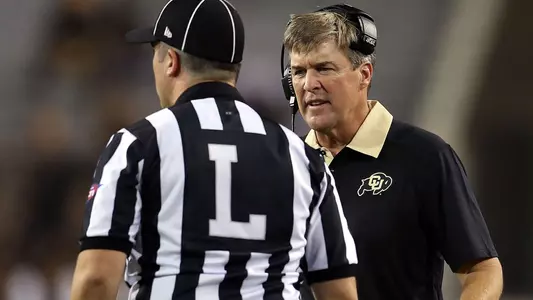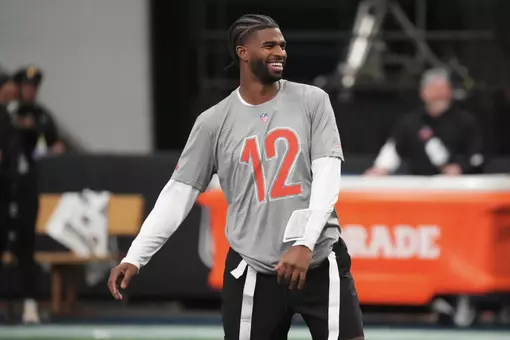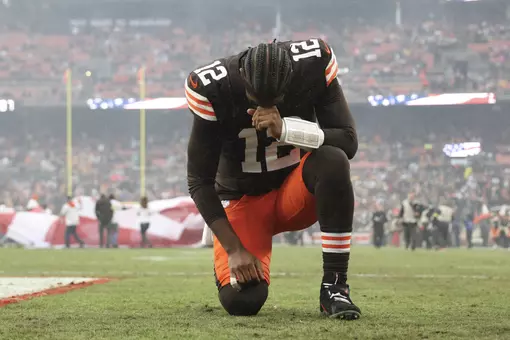Colorado University Athletics

Woelk: Signature Win Would Be Big Boost For 2016 Buffs
July 12, 2016 | Football, Neill Woelk
Win over quality teams a trademark of turnaround seasons
BOULDER — When Colorado football coach Mike MacIntyre takes the stage Friday in Hollywood for Pac-12 Media Days, he'll be asked about the Buffs' progress as he enters his fourth year in Boulder.
MacIntyre will likely talk about this being a potential breakthrough year for Colorado. He'll note that the Buffs have been close — painfully close — to at least a half-dozen conference victories in the last two years that ultimately slipped away. He'll remind media members that in the last two seasons, eight of CU's losses have come by a combined 35 points, including three games in 2015 in which Colorado held the lead in the third or fourth quarter.
He'll also note that this year's team will be dominated by experienced upperclassmen, meaning the foundation for success has been laid.
Now, the task at hand will be to get over the hump in those close games.
For those with long memories, it is a storyline that has played out before in CU history, one in which the parallels to this season are hard to ignore. It is also one Buffs fans hope will be repeated.
Long-time CU fans will remember the fourth and fifth years of the first Coach Mac era — the Bill McCartney era — as the years that changed the trajectory of the program.
In McCartney's fourth year (1985), the Buffs went from a 1-10 record the year prior to a 7-5 finish and a bowl game appearance. A year later, the Buffs came back with a 6-6 mark and a second-place finish in the Big Eight — after an 0-4 start to the season — and another bowl appearance.
Those were the seasons that firmly established the foundation for the "glory years," the span that included a 1989 undefeated regular season, a 1990 national championship and eight consecutive seasons ranked in the nation's top 20 at year's end. They are the years that Buffs fans remember fondly, and a stretch they hope to see repeated again someday.
But it's worth remembering that those years would not have been possible had it not been for those squads in the mid-1980s, made up of players who endured the lean years before finally turning the corner.
That's where this year's Buffs enter the picture. After more lean years than anyone close to the program would like, can these be the Buffs that execute a program turnaround?
Certainly the pieces appear to be in place. The Buffs return a host of starters on both sides of the ball this season, including almost everyone on a defense that one year ago was one of the most improved in the nation in the most important defensive statistical category of all — points allowed. They also return key starters on offense, including at every skill position, as well as plenty of experience up front. It means a huge portion of the Buffs' starting lineup will have played in close games, and hopefully know how to close the deal this season.
But turnaround seasons — those that truly establish a firm footing for the future — almost always include more than "just" a few more victories than the prior season.
They also include a signature win or two, victories that most people didn't expect, the kind of victories that turn heads around the nation.
In 1985, the Buffs did exactly that with a win at Arizona. A 2-1 CU team — coming off a home loss to Ohio State — went to Arizona and handed the 3-0 Wildcats their first loss of the season, 14-13. It was a win that got people's attention and one that convinced those Buffs they could play with upper-echelon squads.
A year later, however, came the win that left no doubt. After 19 years of frustration against Big Eight powerhouse Nebraska, the Buffs gave McCartney his first win over the Cornhuskers. CU's 20-10 win over third-ranked and unbeaten NU sent a message that couldn't be ignored: the Buffs were ready to compete in one of the nation's toughest conferences. The win not only set the stage for a 6-1 Big Eight finish and bowl appearance, but established a foundation that would pave the way for what proved to be the most successful stretch in Colorado football history.
Those '85 and '86 teams were not squads overflowing with highly touted recruits. But they did have players who came to Colorado (and many of them were from Colorado) with the mindset of being the group that put the Buffs back on the map. They bought McCartney's pitch that they could be the group that made the difference. By the time Barry Remington, Don DeLuzio, Jon Embree, Anthony Weatherspoon, Eric McCarty, Mark Hatcher, Lance Carl, Mike Marquez and Mickey Pruitt — just to name a few — had departed, they left with the satisfying knowledge that Colorado football was indeed on firm footing.
They had paved the way for future recruiting classes, who then built on what they had established. They gave fans hope and gave the nation a reason to once again pay attention to the Buffaloes.
Now, the 2016 Buffs have that same opportunity.
Once again, it is a team by no means laden with highly touted recruits. But it is a team of battle-tested young men who have endured difficult times and have the capability to turn CU's fortunes back in the right direction.
It is Chidobe Awuzie and Tedric Thompson, Sefo Liufau and Phillip Lindsay, Sean and Jeromy Irwin, Derek McCartney and Jimmie Gilbert. It is Addison Gillam and Kenneth Olugbode, Shay Fields and Donovan Lee, Josh Tupou, Jordan Carrell, Jaleel Awini and Ryan Moeller; Alex Kelley, Jonathan Huckins and Gerrad Kough.
It is every player on the team, a group that has endured the difficult times and has the ability to change the course. Most of all, it is a team whose whole could be greater than the sum of its parts — if every member plays to his potential.
If the Buffs do that, they could produce that turnaround season, the year that CU fans will remember as the pivotal one. To accomplish that, a signature win — that victory that nobody outside the Champions Center truly expects — would be a huge step.
Certainly the opportunities will be available. There are games at Michigan, Oregon, USC and Stanford, all of whom could be ranked when they play. There is a home game with UCLA, also likely to be ranked. Other quality teams scheduled to visit Folsom include ASU, Washington State, Utah and Arizona. (Just in case you were wondering, that 1986 win over Nebraska was CU's first against a ranked team since 1978, ending a 23-game skid against top-20 teams.)
Is a win against a ranked team mandatory? Of course not. The 1985 win over Arizona was no doubt a turning point (the Wildcats finished the season 8-3-1 that year), but Arizona wasn't ranked at the time.
But the Buffs do need a win against a quality opponent, the kind of win that changes the locker room attitude from "we're good enough to beat a good team" to one that says "we beat a good team."
What is quite obvious is that not many people outside of Boulder expect it to happen. Most preseason prognostications pick the Buffs to finish sixth in the six-team Pac-12 South. Given recent history, that should come as a shock to no one.
But turnaround seasons are seldom seen in anyone's crystal ball. More often, they come as a surprise, an unexpected storyline.
This year, the Buffs have the opportunity to produce one of those storylines, one of those years that will be remembered for years to come.
Crystal ball? Not in this corner.
But one thing we do know is the history books are waiting — and the 1985 and '86 Buffaloes wouldn't mind a little company.
Contact: Neill.Woelk@Colorado.edu






















